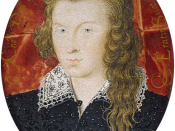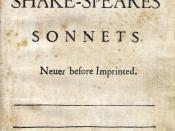SONNET 98
Sonnet 98 contains several expressive elements that the author effectively employs to express his emotions regarding a recent departure from his lover. Various examples and styles range from using lunar imagery of planets, the robust, and descriptive words of love, poetic devices of comparison, and personal pain. This sonnet is one of 154 sonnets written by William Shakespeare in which it is a part of the Fair Youth sequence. In addition to two other sonnets, this being the third sonnet describes the author expressing his love towards another.
The sonnet is about a person is apart from his lover during the springtime where everything should feel young, to include an aged planet, Saturn. He is not able to experience any joy even as he is surrounded by the spring season when all things are in bloom, and recovering from the dead of winter. He even compares two beautiful flowers he cannot acknowledge, the rose and lily for their beauty because of his pain.
Ultimately leading back to comparing the time line to winter since the lover was away.
To begin, the author writes about when they are first separated in the spring and draws upon the season of growth as an antecedent from the dead of winter. It can be understood as a deep pain and comparison of life to ache. "Hath put a spirit of youth in every thing" is similar to when everything surrounding me feels young, reborn, and alive. But the author isn't able to admire or feel such beauty of flowers, because in his mind they were relics of his lover, and the season felt like winter rather than spring.
"Yet seem'd it winter still, and, you away" reveals a deep sense of pain, an almost death like much like when Demeter is reunited...


